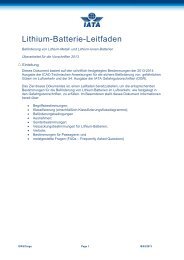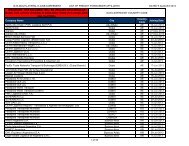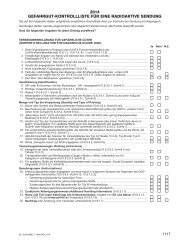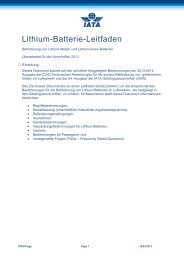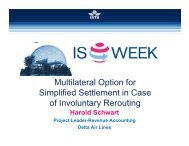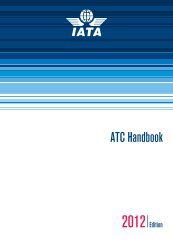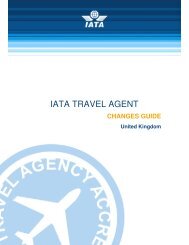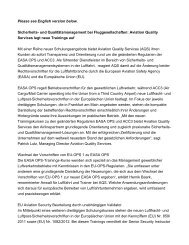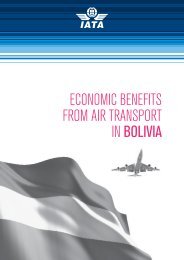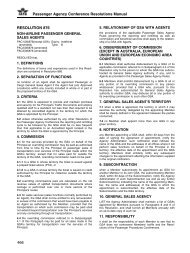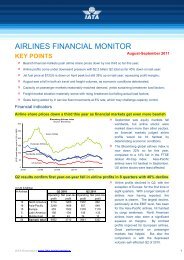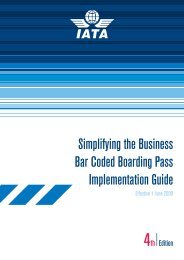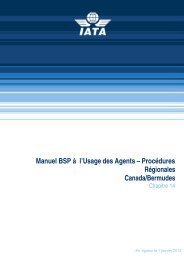You also want an ePaper? Increase the reach of your titles
YUMPU automatically turns print PDFs into web optimized ePapers that Google loves.
Simplified Interline Settlement<br />
(SIS) is the biggest<br />
change in billing and settlement<br />
since 1947.<br />
The newly developed SIS<br />
web interface is an electronic<br />
invoicing system that optimizes<br />
interline billing and settlement<br />
processes. In SIS, electronic<br />
billing files submitted by members<br />
are automatically processed<br />
and sent to the relevant<br />
ICH for automated settlement,<br />
and the output files are then<br />
created and submitted to the<br />
partners. In this way, paper no<br />
longer circulates among the<br />
billing partners and, thanks<br />
to the new billing standards,<br />
account posting and reconciliation<br />
can be automated.<br />
In the first three months of its<br />
operation in the fourth quarter<br />
of 2011, SIS processed $1.68<br />
billion in settlements, up to<br />
24% of the ICH settlement<br />
value, each week. On 8 May<br />
<strong>2012</strong>, the second stage of SIS<br />
was implemented, extending<br />
SIS to cover cargo and the<br />
Universal Air Travel Program,<br />
thus completing the delivery of<br />
the new service.<br />
50<br />
<strong>IATA</strong> works with governments<br />
to repatriate funds from<br />
restricted markets.<br />
According to the preliminary<br />
2011 Remittance of Foreign<br />
Balances (RFB) survey results,<br />
$531 million of members’ funds<br />
remains delayed or blocked<br />
in 14 countries. This is an<br />
increase of $15 million over<br />
the 2010 year-end figure. Of<br />
this total, $339 million is in<br />
Venezuela, representing 64%<br />
of the total. Some progress<br />
was made with the Venezuela<br />
Central Bank in 2011; average<br />
delays were reduced to less<br />
than five months, down from 10<br />
months in 2009. Other markets<br />
where airline funds are withheld<br />
or delayed include Sudan, Iran,<br />
Eritrea, and Algeria.<br />
<strong>IATA</strong> helps airlines to access<br />
funds from these restrictively<br />
regulated markets and countries.<br />
Based on the results of<br />
the annual RFB, <strong>IATA</strong> works<br />
with airlines to lobby local<br />
governments and authorities<br />
with a view to speeding up the<br />
repatriation process.<br />
$531<br />
million<br />
Total member funds in<br />
$ millions blocked<br />
in 14 countries.<br />
Airline infrastructure charges<br />
are reduced through the <strong>IATA</strong><br />
Enhancement and Financing<br />
(E&F) Service.<br />
The <strong>IATA</strong> E&F Service offers<br />
ANSPs and airport authorities<br />
the opportunity to improve<br />
the efficiency and quality of<br />
their user charges invoicing<br />
and collection process. The<br />
service helps users to strengthen<br />
their cash flow and benefit<br />
from economies of scale.<br />
E&F can also help airports and<br />
ANSPs to secure cost-effective<br />
financing for investments in civil<br />
aviation infrastructure.<br />
Most of the invoices produced<br />
by E&F can be submitted<br />
electronically to the airlines and<br />
settled through the <strong>IATA</strong> settlement<br />
systems. Airlines, airports,<br />
and ANSPs benefit from the<br />
service through standardized<br />
invoicing and highly secure and<br />
efficient settlement processes.<br />
In 2011, <strong>IATA</strong>’s E&F Service<br />
processed more than $2.1 billion<br />
in 48 countries.



